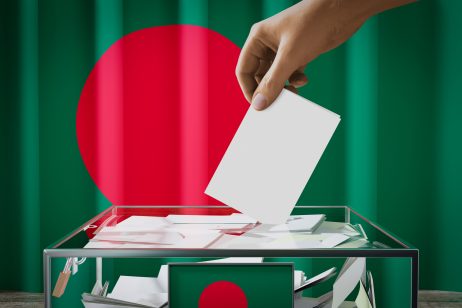Are Bangladesh’s Overseas Guardians of Democracy Being Silenced?
Red tape could discourage 13 million expats from casting their ballots just when their country needs them most.
Mujahed Islam and Muhib Rahman | 29 September 2025
Last year, as Bangladesh’s long-standing autocratic regime finally fell, the cheers traveled far beyond Dhaka. The celebration swept through London’s Brick Lane, Toronto’s Scarborough, and WhatsApp groups across the Gulf. Expatriates – from nurses in New York to construction crews in Qatar – had spent years wiring billions home to keep the economy alive and marching in foreign capitals demanding free elections.
The new interim government, led by Nobel Peace laureate Muhammad Yunus, promised to give every citizen a voice – including the diaspora that had championed democracy from afar.
But just months before the country’s first truly competitive vote in 15 years, roughly 13 million overseas Bangladeshis can face significant obstacles to their most basic democratic right – the right to vote – due to the Bangladesh Election Commission’s new registration rules.
To register from abroad, expatriates must supply up to 11 documents: a valid passport, birth certificate, school records, utility bills, a marriage license, and even letters endorsed by rural officials who are rarely reachable through international calls. Some items are technically “optional,” but the message is unmistakable: unless you can navigate this bureaucratic gauntlet, stay silent.
Most migrants left Bangladesh with little more than a passport. They cannot hop a flight to chase a village chairman for a notarized note. For citizens who prop up Bangladesh’s economy and fought for its democracy, this almost amounts to disenfranchisement disguised as due process. Shutting them out of the next election will hurt everyone in Bangladesh.
Migrant workers send home over $20 billion a year, roughly 6 percent of GDP. That money pays school fees, builds clinics, and props up the taka, Bangladesh’s currency. Telling them their voices don’t count slices straight through the hope they helped build.
Many members of the Bangladeshi diaspora know democracy. Hundreds of thousands live in Britain, Canada, and the United States. Many have staffed polling stations and seen clean elections up close. Include them, and Bangladesh’s democracy gains millions of voters versed in fair practice.
During years of repression, diaspora networks kept Bangladesh in international headlines and on lawmakers’ agendas. Marginalizing them now risks turning vocal allies into even louder critics.
Finally, their ballots could swing races. In many of the 300 parliamentary seats, the diaspora outnumbers the last winning margin. Even a modest overseas turnout could overturn incumbents in those districts and tip the balance of power in parliament. Excluding these voters calls any result into question.
If Bangladesh’s expatriates formed their own electorate, they would outnumber the combined voting populations of Ireland, Austria, or Finland – countries that keep overseas voting simple and accessible.
Canada uses an online form and a prepaid envelope. India lets citizens vote at consulates. The Philippines accepts postal and proxy ballots. Each relies on two core checks: proof of citizenship and proof of a home district.
Bangladesh already maintains a fingerprint-linked national ID database. A streamlined system could rest on one document that proves citizenship (passport or birth certificate) and one database match to a constituency. Everything else – school certificates, village signatures – is paperwork for paperwork’s sake.
The election is slated for February. For migrants who must notarize forms across time zones, the deadline might as well be tomorrow. Every week of delay locks in exclusion.
Interim leader Yunus has staked his legacy on a clean vote. The fix is clear: Scrap the document maze. Launch a secure online portal. Mail ballots early enough to cross oceans and be returned.
Take these steps, and Bangladesh proves its democratic reset is real. Refuse, and cynics will conclude that only the faces on top have changed.
After years of drift, this moment offers a chance to rebuild trust. That begins by ensuring every Bangladeshi – at home or abroad – can vote without obstruction. The diaspora sends labor, talent, and billions in remittance; it deserves more than slogans.
Welcoming money while blocking ballots sends a brutal message: we want your cash, not your opinions. That perception will linger long after campaign posters come down, affecting investment, diplomacy, and the morale of the very workers who keep Bangladesh afloat.
Democracy isn’t just about who shows up at the polls; it’s about who’s invited. Currently, 13 million citizens are awaiting their invitation. Bangladesh can send it – quickly – or risk turning last year’s celebrations into just another false dawn.
Mujahed Islam and Muhib Rahman are writers.
This article was originally published on The Diplomat.
Views in this article are author’s own and do not necessarily reflect CGS policy.
